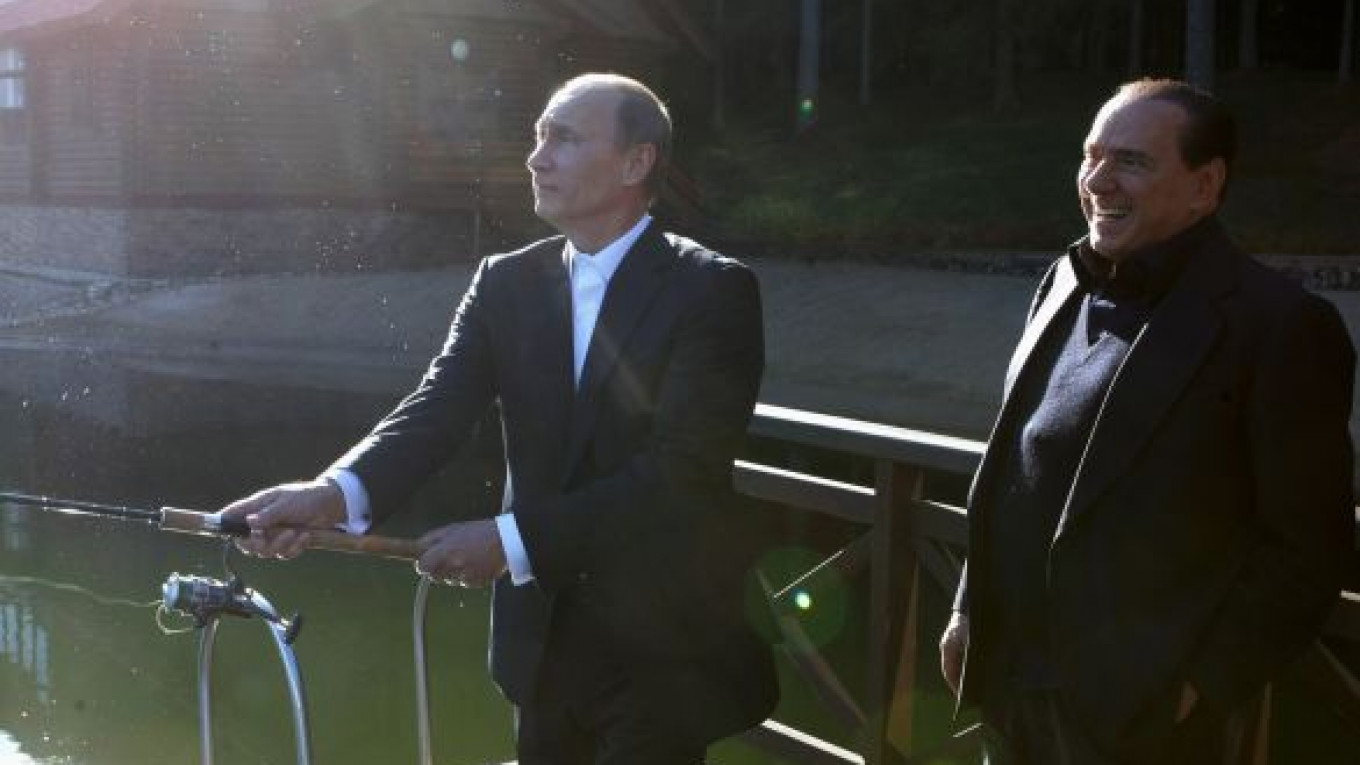ROME — When French President Nicolas Sarkozy hosted his Russian and German counterparts for talks on European security Tuesday, Europe’s second-biggest energy partner with Moscow was not there.
Italy’s Silvio Berlusconi wasn’t invited.
A guest at Vladimir Putin’s private birthday bash this month, the Italian prime minister has been a pioneer among European Union leaders in forging ties with energy-rich Russia, Central Asia and Libya. While his personal diplomacy is paying dividends for companies such as Eni, it has rankled some allies while failing to win Italy a place at the table with France and Germany, the traditional EU power brokers.
“Compared with a few years ago, Italy is punching below its weight at the European Union and in global organizations in general,” said Raffaello Matarazzo, a scholar at the Istituto Affari Internazionali, a Rome-based research institute. “Italy had Romano Prodi as European Commission president, Renato Ruggiero as World Trade Organization head and others like Mario Monti in important EU roles. Now, Italy’s got almost no one.”
Berlusconi, 74, often takes credit for key achievements abroad, which the opposition says he exaggerates. In remarks last month to the Senate in Rome, he said he had helped end the financial crisis by persuading former President George W. Bush to bail out Wall Street. He also said he had used his friendship with Putin to stop the 2008 Russia-Georgia war, preventing Georgian President Mikheil Saakashvili from being “hanged from the highest tree.”
Italy’s Foreign Ministry did not reply to questions about why Berlusconi was not included in Tuesday's meeting.
Last year, Italy failed to secure its candidates for two major EU jobs. Five years after Prodi left as EU commissioner to re-enter Italian politics, Mario Mauro was defeated in his bid to become president of the European Parliament, while former Prime Minister Massimo D’Alema did not get the post of foreign policy chief. This year is unlikely to prove better, with Italy winning just one of 29 senior jobs in the EU diplomatic corps, the European External Action Service, after applying for 13.
“If you don’t get your people into the key jobs, then you’re less likely to take part in the key decisions in the future,” said Christopher Hill, a professor of international relations at Cambridge University. “It’s a compound effect.”
Sarkozy called the summit Tuesday in the resort of Deauville to discuss “partnership in all areas and security” with German Chancellor Angela Merkel and President Dmitry Medvedev, according to a Sept. 27 statement. While energy was on the agenda and Italy has key gas and oil ties with Russia, Berlusconi was not asked to attend as other European leaders also would have had to be invited, said a French official who could not be identified because of policy rules.
France and Germany wanted to use the talks to show that their alliance “continues, and continues at the EU level,” said Francois Lafond, director of the German Marshall Fund in Paris.
Berlusconi’s exclusion from the talks may also be because of his own diplomatic conduct, he said.
“He has good relations with Russian leaders, but he takes such initiatives on his own,” Lafond said. “Maybe Berlusconi is paying for his attitude and way of managing the country.”
NATO member Italy has long run against the Western current in reaching out to Russia, a policy that has generated lucrative contracts as well as criticism from allies, whether conducted by Berlusconi or his predecessor, Prodi. Italy’s gas and oil trade with Russia is second only to Germany’s in Europe, EU data show.
Berlusconi spent two days with Putin at an undisclosed location near St. Petersburg, discussing energy and trade and celebrating Putin’s birthday, Putin's spokesman Dmitry Peskov said in a conference call on Oct. 7, Italian news agency Ansa reported.
Italy has “succumbed to a race-to-Moscow mentality that has undermined American and European interests,” said Stephen Sestanovich, who served as special adviser on the former Soviet republics to former U.S. Secretary of State Madeleine Albright.
Eni has been a key policy driver. Italy’s biggest energy company was a Cold War pioneer, signing its first contract in the Soviet Union in 1958. It built on those ties after 1991 to forge a broad partnership with Gazprom including the South Stream pipeline, a rival of the Nabucco project backed by the United States and the EU to lessen reliance on Russia. Eni has also expanded into Kazakhstan and Turkmenistan, whose leader visited Rome last year in a rare foray to Europe.
Under Berlusconi, Italy also forged a historic treaty with Libya in 2008 that paved the way for 25 billion euros ($35 billion) in Eni projects in the North African nation over the next decade and Libyan stakes that total 7.6 percent of the shares in UniCredit, Italy’s biggest bank.
“What are the metrics for success for his personal diplomacy?” said Heather Conley, director of the Europe program at the Washington-based Center for Strategic and International Studies. “Is there evidence of increasing commercial ties? If so, then he has been very successful.”
A Message from The Moscow Times:
Dear readers,
We are facing unprecedented challenges. Russia's Prosecutor General's Office has designated The Moscow Times as an "undesirable" organization, criminalizing our work and putting our staff at risk of prosecution. This follows our earlier unjust labeling as a "foreign agent."
These actions are direct attempts to silence independent journalism in Russia. The authorities claim our work "discredits the decisions of the Russian leadership." We see things differently: we strive to provide accurate, unbiased reporting on Russia.
We, the journalists of The Moscow Times, refuse to be silenced. But to continue our work, we need your help.
Your support, no matter how small, makes a world of difference. If you can, please support us monthly starting from just $2. It's quick to set up, and every contribution makes a significant impact.
By supporting The Moscow Times, you're defending open, independent journalism in the face of repression. Thank you for standing with us.
Remind me later.






